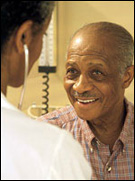Current Features
Protect Yourself Against Shingles: Get Vaccinated


Shingles, also known as herpes zoster, is a disease that causes a painful skin rash. In addition, shingles can lead to severe pain that can last for months or even years, a condition known as post-herpetic neuralgia. Shingles can lead to other serious complications as well, including eye problems (when shingles affects the eye) and, more rarely, pneumonia, hearing problems, blindness, and brain inflammation (encephalitis). In rare cases, shingles can also lead to death.
Shingles is caused by the varicella zoster virus (VZV), the same virus that causes chickenpox. After a person recovers from chickenpox, the virus stays in the body in a dormant state. For reasons that are not fully known, the virus can reactivate years later, causing shingles.
Almost one out of three people in America will develop shingles during their lifetime. Last year, nearly 1 million Americans experienced the condition. The disease poses a greater risk to older people; about half of all cases occur among men and women 60 years old or older.
Is Shingles Contagious?
Shingles cannot be passed from one person to another. However, a person with active shingles can transmit the virus that causes shingles, VZV, to a person who has never had chickenpox -- but only through direct contact with the shingles rash. If a person who has never had chickenpox is infected with VZV, he or she will develop chickenpox, not shingles.
How Can You Reduce Your Risk of Getting Shingles?
The only way to reduce the risk of developing shingles and the long-term pain that can follow shingles is to get vaccinated. Adults 60 years old or older can receive a single dose of the shingles vaccine, called Zostavax®.
Some people in this age group should wait to get vaccinated, or should not get vaccinated at all, if they have certain medical conditions, particularly if they have a weakened immune system. For a list of these conditions, see Shingles (Herpes Zoster) Vaccine.
For more on shingles and the shingles vaccine, see About the Disease.
For additional information on the vaccine, read Prevention of Herpes Zoster: Recommendations of the Advisory Committee on Immunization Practices (ACIP) (15 May 2008/57(Early Release);1-30).
Page last updated: May 28, 2008
Content source: National Center for Immunization and Respiratory Diseases
Content owner: National Center for Health Marketing
URL for this page: www.cdc.gov/Features/Shingles

